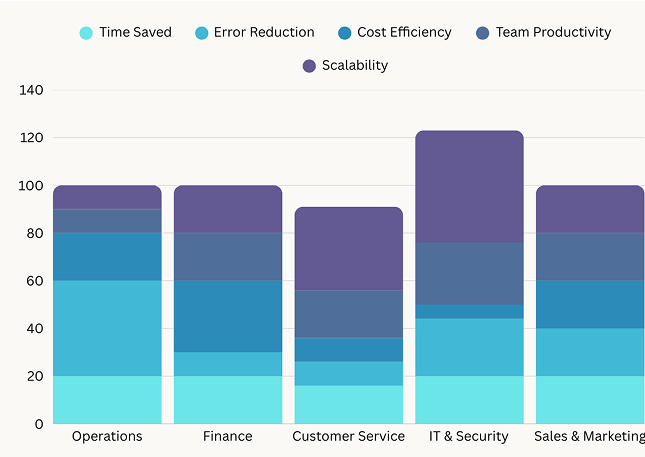
We design and build systems that keep tasks, approvals, and teams moving with clear ownership, real-time visibility, and fewer bottlenecks.
We design and deploy software bots that mimic human actions automating routine tasks across systems with speed, accuracy, and zero fatigue.
We help streamline sales pipelines and marketing workflows from lead capture to customer engagement using smart triggers and integrated tools.
We implement real-time dashboards and insights — helping you measure, monitor, and optimize the performance of every automated process.
We build automation using flexible, low-code tools enabling fast rollout of workflows without relying on deep technical effort or full-stack dev time.
We help streamline IT workflows like ticketing, user provisioning, monitoring, and incident response reducing manual load and improving system uptime.
We help streamline IT workflows like ticketing, user provisioning, monitoring, and incident response reducing manual load and improving system uptime.
We streamline repetitive HR and finance tasks from payroll and reimbursements to onboarding and leave approvals with reliable, rule-based automation.
We build automated systems that clean, organize, and move data between platforms cutting down manual work and improving accuracy at scale.
We create automation for ticketing, FAQs, and customer interactions reducing response time, improving consistency, and freeing up your support team.
We design systems that automate cross-team workflows helping businesses reduce effort, improve accuracy, and keep operations running smoothly at scale.


Robotic Process Automation (RPA) is a technology that uses software robots or “bots” to automate repetitive, rule-based tasks typically performed by humans. It helps organizations increase efficiency, reduce errors, and save time by automating processes like data entry, invoice processing, payroll, and customer service workflows without changing existing systems.


RPA can automate repetitive, rule-based business processes across functions like finance (invoicing, payroll), HR (onboarding, data entry), customer service (ticket handling, order tracking), and supply chain (inventory updates, shipment processing). Any structured, repetitive task is a strong candidate for automation, helping save time, reduce errors, and improve efficiency.


Automation reduces costs by minimizing manual effort, speeding up processes, and reducing errors, which lowers labor and operational expenses. It also improves efficiency and productivity, allowing employees to focus on higher-value tasks, and reduces compliance risks and rework, leading to long-term savings for the business.


The time to implement workflow automation depends on process complexity, number of systems integrated, and customization needs. Simple workflows like basic approvals or notifications can be deployed in 2–4 weeks, while medium-complexity processes with multiple systems may take 2–3 months. Enterprise-scale automation involving many departments, custom rules, and integrations can take 4–6 months or more.


Yes, process automation can be secure and compliant when implemented with robust access controls, encryption, and audit trails. Compliance is ensured by adhering to industry regulations like GDPR, HIPAA, and India’s DPDP Act, along with regular monitoring, logging, and risk assessments. Proper governance ensures that automated processes maintain data privacy, integrity, and regulatory standards.

